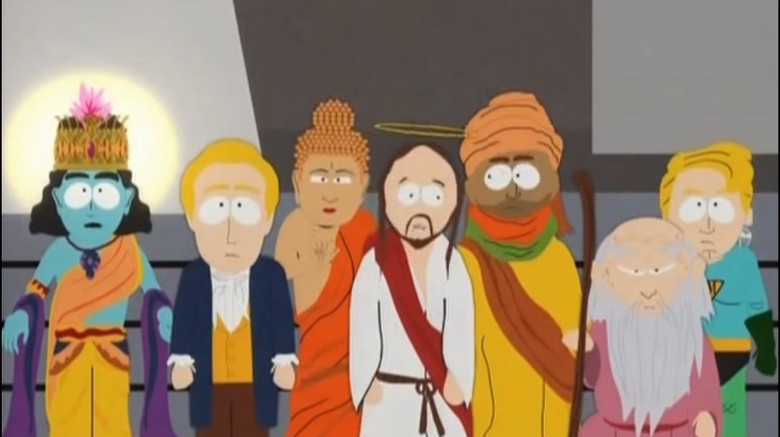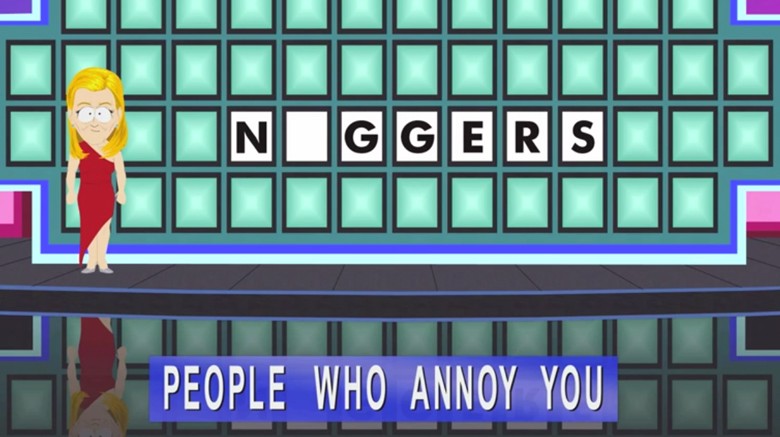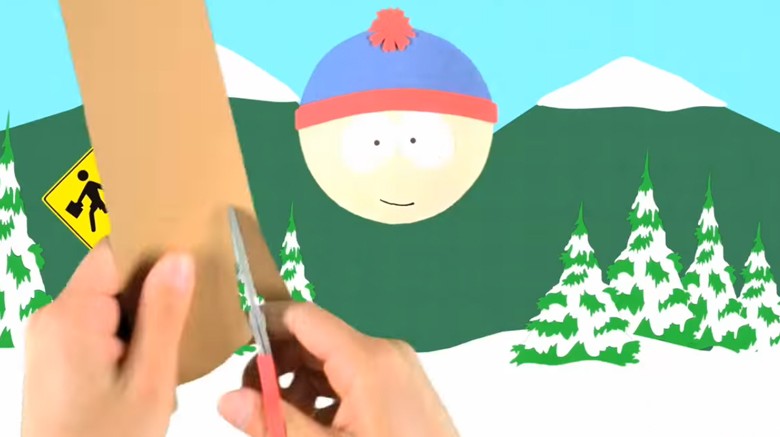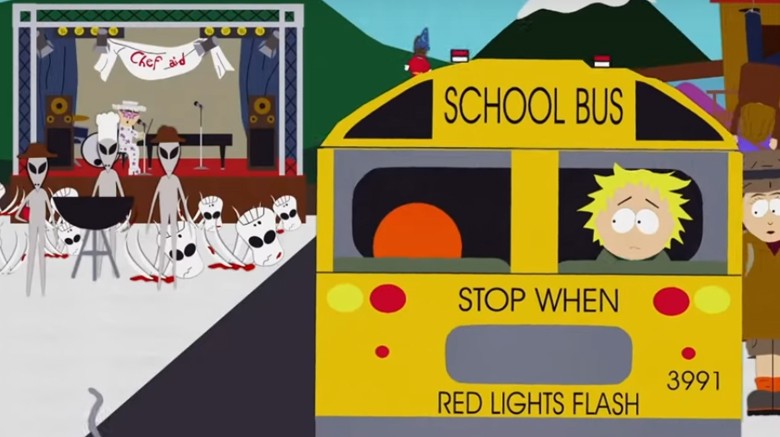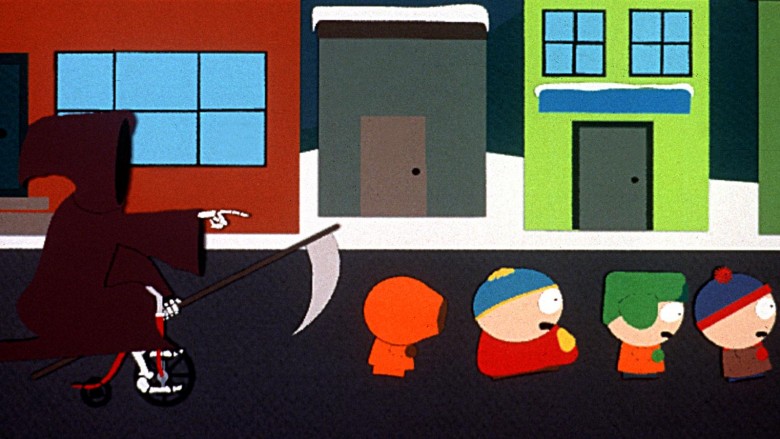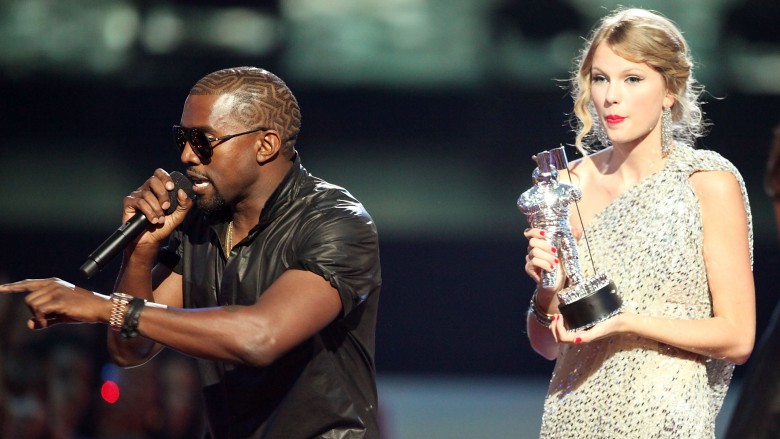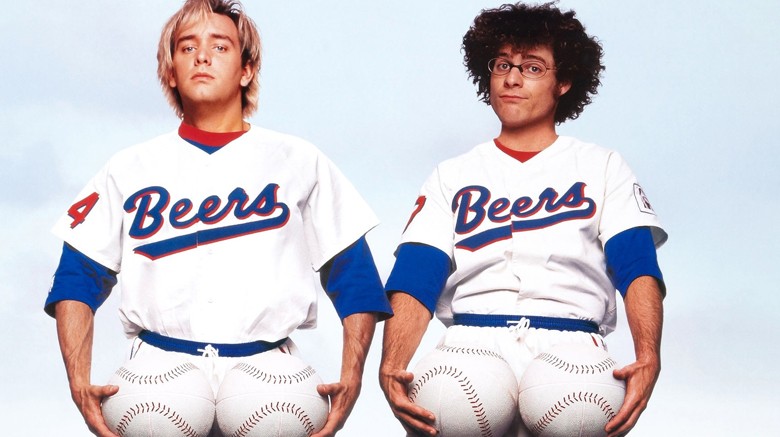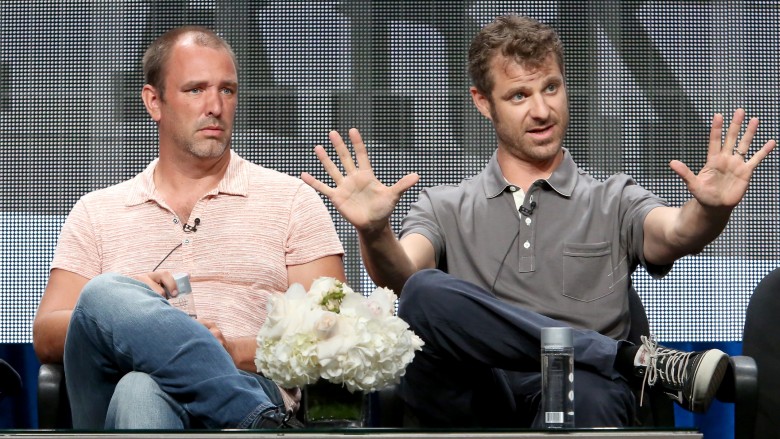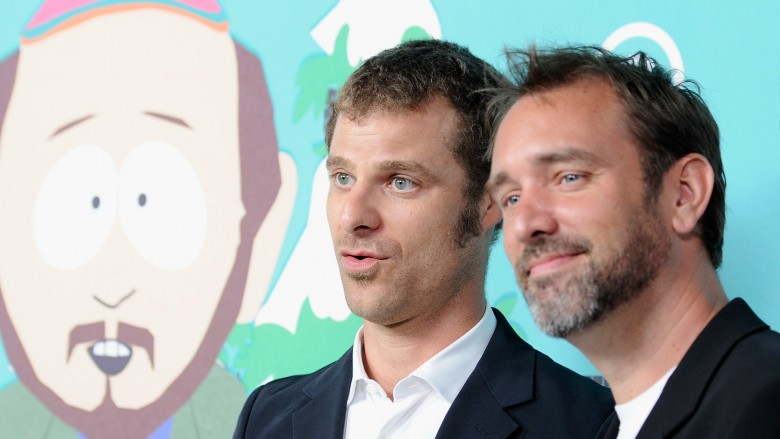South Park Myths Everyone Believes
South Park has been lampooning pop-culture and metaphorically dunking on celebrities for two decades now and in that time, numerous misconceptions and myths have arose about the show. Here are the real stories behind South Park myths — now we can all claim to have learned something today.
They've never shown Muhammad
Perhaps the biggest controversy in show history is when they attempted to show an uncensored image of the prophet Muhammad in 2010. According to the show's creators, Matt Stone and Trey Parker, their plan was simply to show Muhammad "just standing there," doing nothing in particular, to highlight the hypocrisy of being unable to show Muhammad in even a neutral light, while the show has aired far more blasphemous footage of Jesus and other religious figures in the past.
Unfortunately, Comedy Central censored all mentions and depictions of the Prophet, prompting widespread criticism from a number of sources. The network doubled down by refusing to air the episode a second time, and making it unavailable to view online. This especially surprised Stone and Parker, since Muhammad was shown uncensored in an earlier episode of South Park, and nobody gave a flying fart about it back then.
The 2001 episode, titled "Super Best Friends," prominently features the Prophet, Moses, Jesus, and Buddha as a Justice League-esque band of godly superheroes. Muhammad gets wicked-sick flame powers, a hero-beard, and gets punched by a giant statue of Abe Lincoln. Thing is, as this episode aired before 9/11, the rise of Al-Qaeda, radical Islam, and some group called Revolution Muslim threatening Parker's and Stone's lives for even trying to show the Prophet. It's amazing what you can get away with when your bosses aren't afraid.
To this day, you can't watch any Muhammad episode on South park Studios (not even Super Best Friends), but you can see the Prophet in the opening credits of several seasons, somewhere among the hundreds of other characters that have themselves a time there. Censor THAT.
The groups they poke fun at always get offended
You'd think that, given its crude sense of humor, penchant for scattering poop jokes in with its messages, and knack for mocking literally everybody, few advocacy groups would support South Park, even if it didn't make fun of them that week. As it turns out though, quite a few prominent groups representing people mocked or lampooned by the show have praised it, for being fairly even-handed in its approach. In short, mock a few groups and you're a jerk. Mock everyone and you're cool.
For example, the episode "Le Petit Tourette" prominently features jokes about tourette's sufferers, but was applauded by the Tourette's Syndrome Association for its accurate portrayal of the condition. Likewise, a group linked with the NAACP lauded the episode "With Apologies to Jesse Jackson" for airing the N-word uncensored and portraying the impact it can have on black people hearing it in a sensitive manner. Finally, representatives of perhaps the most mocked people in show history — Jews — have repeatedly supported the show, both for its nuanced portrayal of the kind of accepted anti-semitism Jewish people face on a day to day life ... and sometimes just because they find it funny.
Paper is still used during production
South Park has a unique animated style with characters, backgrounds and, well everything else looking like they're entirely made out of construction paper. Today the show is entirely realised using computers and digital software and we presume, a mouse and keyboard, with animation deliberately made to look as crappy as possible so it looks like it's still being animated by hand.
With this in mind, when do you think actual construction paper stopped playing a part in the animation process? Season five? Six? If you answered anything other than the "second-ever episode," you'd be wrong. Yes, there hasn't been a single piece of construction paper used for a single episode of South Park since the first episode, in 1997. Every episode since has been realised using increasingly sophisticated digital methods, with the closest the animators have got to using construction paper being the time they scanned every piece of pilot-episode paper into a big computer to use as reference. In short, we're seeing the same paper cutouts used when Cartman got an anal probe, but so much shinier and difficult to lose.
An Alien appears in every episode
Watch South Park enough and you'll begin to notice that the series has a lot of running jokes, Easter eggs, and stuff hidden in the background seemingly added just to make people hit pause on their DVD player. Among the most enduring running jokes is the hiding of aliens in the background of various episodes by the animators. It's so pervasive there's a popular rumor that there's an alien in the background of every episode ever aired. Which just isn't true.
While some of the hidden aliens are exactly that (some are visible for only a single frame of animation, or hidden in a minor background element), animators for the show have denied that they've gone as far to hide one in every episode. Why? Well mostly because the guy whose job it is to do it often forgets before they send episodes to Comedy Central. As a result of this, even the animators don't know exactly how many aliens are dotted throughout the series, only that there are probably quite a few, and that you're probably kind of lame for looking for them.
Kenny dies in every episode (in the first five seasons)
It's often thought that Kenny died horribly in every single episode of the show's first five seasons, prior to being killed off "for good" in season six. That for good, lasted maybe half a season, by the way.
While Kenny certainly met his maker a whole lot during the first five seasons, there were several episodes in which the foul-mouthed parka aficionado side-stepped the Reaper. Kenny survived being struck by lightning in the first episode of Season 3, "Rainforest Shmainforest," walks off being hit by a bus in Season 4's "Do the Handicapped Go to Hell?" and isn't even injured in at least half a dozen other episodes, including the first Christmas special and an episode centred around Terrance and Phillip in Season 5. Parker and Stone admit they stopped killing Kenny because they grew bored with the character and his death gimmick, but it's amazing how quickly they grew bored with it.
Kanye West hated the episode that mocked him
Spend enough time online, and you'll eventually stumble on an article discussing the time Comedy Central played an episode making fun of Kanye West like eight times in a row, following the singer's infamous outburst at the 2009 VMAs. The episode, simply titled "Fish Sticks," mocks West's massive, swollen ego, and features a running joke that he enjoys homosexual relations with fish, ending the episode with a song parodying his own style titled, aptly enough, "Gay Fish".
Surprisingly West actually didn't mind the episode, or even the insinuation he was the "gayest of the gay fish," writing on his blog that he found the episode HILARIOUS, in all caps so you know he was being super serious. West thanked the show for helping keep his ego in check, gave the animators a special shout-out for taking the time to faithfully animate his crew, and admitted that he totally understood why people felt that way about him. And Kanye West never did anything stupid or egotistical ever again.
South Park invented the word "derp"
Consult the totally down-with-the-kids Urban Dictionary, and you'll see that the insult "derp" is credited to South Park, specifically the 1999 episode "The Succubus," in which a character called Mr Derp screams the word while hitting himself in the face with a hammer. DERP!
That's not entirely correct, though. While this episode certainly helped popularize the word, it was actually coined in a 1998 live-action film starring Stone and Parker called BASEketball. This is a fact few people seem to be aware of, because absolutely nobody watched that movie. But it's not like Parker and Stone came up with the word, either: oddly enough for one of their collaborations, neither man had a hand in writing any of the film's script, so the word was likely coined by the writer and director of that film, David Zucker, AKA, the guy who wrote Airplane! Makes sense: genius creates genius.
Completing scripts in a week is out of the ordinary is amazing and only they can do it
The creative team behind South Park can write, animate, and record the audio for an episode in as little as 4 days, which stands in stark contrast to the turnaround time of other animated shows, which often take months to complete. This, of course, proves that South Park's writing staff consists exclusively of superhuman genetic freaks with Red Bull for blood who put in as much mandatory overtime as an intern for Apple, right?
Well although the turnaround time for an individual episode of South Park is impressive, Stone and Parker have noted that the time it takes them to write a script (about a week) is actually in line with the same time it takes other shows. Most anyone can write a show in a few days, basically. The pair have admitted that it's their animation style that lets them create episodes in such a short period of time. As they explain, the writers for The Simpsons also write their scripts in a week — it just takes them nine months to animate an episode, because nobody thought to scan in the original drawings from the Tracey Ullman Show and use those forevermore.
Stone and Parker do all the voices
Though it's certainly true that Stone and Parker voice a significant percentage of the South Park cast (voicing all four members of the main cast and most of the town's adults, aside from Chef obviously), they're far from the only voice talent who work behind the scenes.
Along with all the female character which have been voiced by numerous, actual, women over the years (some of whom asked to be credited under a pseudonym, so their ability to secure more PG roles wouldn't be compromised) various members of the production staff have provided voices for notable side characters, like Bebe, Token and Mr. Slave. Additionally all, the kindergarteners featured on the show have been voiced by actual children goaded into saying swear words into microphones, with the promise of candy and major bragging rights at nap time. This includes Parker's own daughter, who voiced Ike, Kyle's Canadian-born adopted brother in the show's 20th season.
Finally, it's also worth noting that most of the animals featured on the show were voiced by celebrities in earlier seasons. Stan's dog's barks and growls were provided by George Clooney, the mews of Cartman's cat were recorded by Jay Leno, and Henry Winkler even provided the guttural screams of an ice cream lovin' big scary monster in one episode. Apparently, South Park is the ultimate ego check.
South Park was sued by Yelp
Yelp doesn't really have the most positive reputation online — you only need to take a look at the time their CEO tried doing an AMA on Reddit, and almost every other question was about whether or not they extorted small businesses for money in return for positive reviews. South Park riffed on these claims, and others, in the 2015 episode, "You're Not Yelping."
Soon after the episode aired, the news spread that Yelp had taken offense, and were suing the show for $10 million. Stone and Parker stoked the flames of controversy by issuing a sarcastic response to the threat, giving their lawsuit claim "one star." The thing is, Yelp never attempted to sue the show, with the story about the alleged lawsuit originating from a satirical website pretending to be NBC. Too bad the hoax only came to light well after the falsehood had spread.
The hoax only came to light after Yelp's image had been irreparably tarnished (again), which is something the company probably should get used to, considering how there's a section on its Wikipedia page about all the controversy they've caused over the years.
